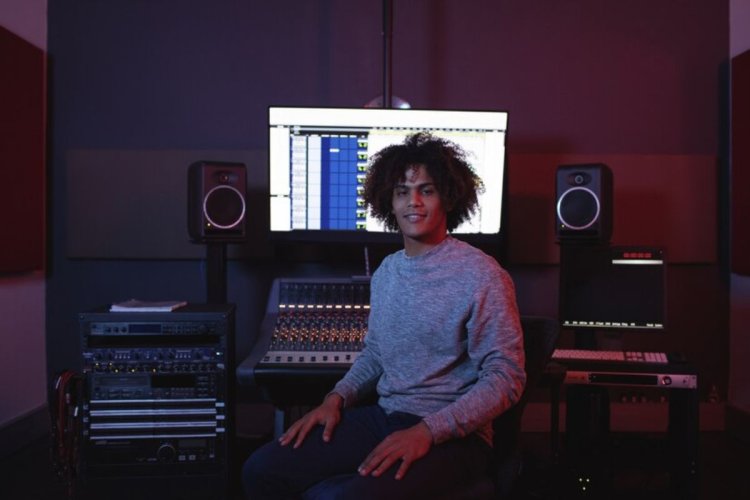Sound Engineering: A Critical Element in Broadcasting
Explore the importance of sound engineering in broadcasting and discover top Sound Engineering Colleges in Bangalore and Chennai for aspiring professionals.

Sound engineering is an essential discipline in broadcasting, a field that thrives on audio's clarity, precision, and artistry. As the media landscape evolves, the role of sound engineers has become even more pivotal, contributing not just to the technical aspects but to the overall creative output. Whether it's music, film, television, or live events, the quality of sound plays a significant role in how audiences experience content. This article delves into the importance of sound engineering in broadcasting, the skills required, and the educational paths available for aspiring sound engineers.
The Growing Role of Sound Engineering in Broadcasting
Broadcasting relies heavily on sound to engage the audience, whether through radio, television, or digital platforms. Sound engineering is the backbone of this process, ensuring the audio components are clear, balanced, and immersive. Sound is used to convey emotion, set the mood, and enhance the narrative of a story. A well-engineered audio setup can make or break the listener's or viewer's experience, so sound engineers are in high demand across various broadcasting channels.
The need for high-quality audio in broadcasting has grown, especially with advancements in digital technologies. Sound engineers are responsible for every aspect of audio production, whether it's a voice-over for a documentary, a sound effect in a film, or background music for a live show. This role involves working with microphones, sound mixers, audio effects, and software, requiring a deep understanding of acoustics and audio technology. The quality of sound engineering directly influences how content is perceived, making it a critical part of the broadcasting industry.
Education and Training for Aspiring Sound Engineers
Choosing the right educational path is crucial for those aspiring to become professionals in sound engineering. Institutions offering specialized training in this field provide in-depth knowledge about sound production's technical and creative aspects. One of the key elements for budding sound engineers is choosing a reliable institution to build their skills. Sound engineering colleges play an instrumental role in shaping the future of sound engineers, offering courses that cover a range of topics such as acoustics, audio production, sound design, and mixing.
For those in India, some of the best Sound Engineering Colleges in Bangalore and Sound Engineering Colleges Chennai offer world-class facilities and expert faculty. These institutions equip students with hands-on experience using cutting-edge audio equipment and software. The curriculum is designed to address both the technical and artistic aspects of sound engineering, ensuring that graduates are ready to tackle the challenges of the broadcasting industry. These colleges are equipped with state-of-the-art studios, practical sessions, and internship opportunities, allowing students to gain invaluable real-world experience in their careers.
Key Skills for Sound Engineers in Broadcasting
A sound engineer in broadcasting needs to possess a diverse set of skills. First and foremost, a strong understanding of audio equipment and software is essential. Sound engineers must be proficient in using mixing consoles, equalizers, compressors, and digital audio workstations (DAWs) to create high-quality sound. In addition, sound engineers need a good ear for detail to ensure that the audio levels are balanced and that no distortion or background noise could detract from the listening experience.
Another crucial skill for sound engineers is the ability to work with a team. Broadcasting projects often require collaboration between multiple professionals, such as directors, producers, and sound designers. Communication skills are essential for understanding the project's needs and translating those needs into effective sound solutions. Adapting and making quick decisions under pressure is also key, as live broadcasts and performances can be unpredictable.
Additionally, sound engineers must have a deep understanding of acoustics. In a recording studio or a live broadcast environment, understanding how sound behaves in different spaces is vital to creating optimal sound quality. This includes knowledge of soundproofing, reverberation, and setting up audio equipment to capture the best possible sound in any given environment.
The Creative Aspect of Sound Engineering
While sound engineering is often seen as a technical field, it also has a creative component. Sound engineers are not just tasked with capturing and mixing sound but also with enhancing the storytelling process. In broadcasting, sound is used to communicate information and evoke emotions. For instance, the sound design in a film can bring the visual experience to life, while the right background score in a radio show can create a specific mood. A talented sound engineer knows how to use audio to elevate a broadcast, making it more immersive and engaging.
In live broadcasting, sound engineers must be particularly creative, adjusting audio levels on the fly to accommodate environmental changes. For instance, in a live radio broadcast, the sound engineer may need to adjust levels for multiple speakers, manage call-ins, or seamlessly mix music and sound effects. Sound engineers may need to design unique sound effects in television or film or work with Foley artists to create sounds that match the visuals. This blend of technical expertise and creativity makes sound engineering in broadcasting so exciting.
The Future of Sound Engineering in Broadcasting
As technology advances, the future of sound engineering in broadcasting looks bright. With innovations in immersive audio technologies, such as Dolby Atmos and 3D sound, sound engineers are given new tools to create more dynamic and engaging audio experiences. The rise of digital streaming platforms also means content creators have more opportunities to experiment with sound innovatively.
Moreover, the demand for high-quality audio in virtual reality (VR) and augmented reality (AR) is expected to grow. Sound engineers are already developing audio for VR and AR experiences, where the sound needs to be spatial and dynamic to match the immersive visuals. As these technologies become more mainstream, sound engineers will be at the forefront of creating new forms of interactive media.
The demand for skilled sound engineers will continue to rise as the media landscape expands in broadcasting. The rise of podcasts, online radio stations, and independent content creators is creating new opportunities for sound engineers. Whether it's working with traditional broadcasters or new media platforms, the need for professionals who understand the intricacies of sound engineering will remain strong.
Conclusion
Sound engineering is a critical element of broadcasting, contributing significantly to how audiences experience media. From ensuring audio clarity and balance to enhancing the creative aspects of storytelling, sound engineers are integral to the success of any broadcast. With the right education and training, aspiring sound engineers can discover successful careers in this ever-evolving field.
Institutions such as Sound Engineering Colleges in Bangalore and Sound Engineering Colleges in Chennai provide the foundation for students to develop the skills and expertise needed to excel in this dynamic industry. As technology advances, the role of sound engineers will only become more important, ensuring that the future of broadcasting remains rich with high-quality, engaging audio content.
What's Your Reaction?














.png)






.jpg)